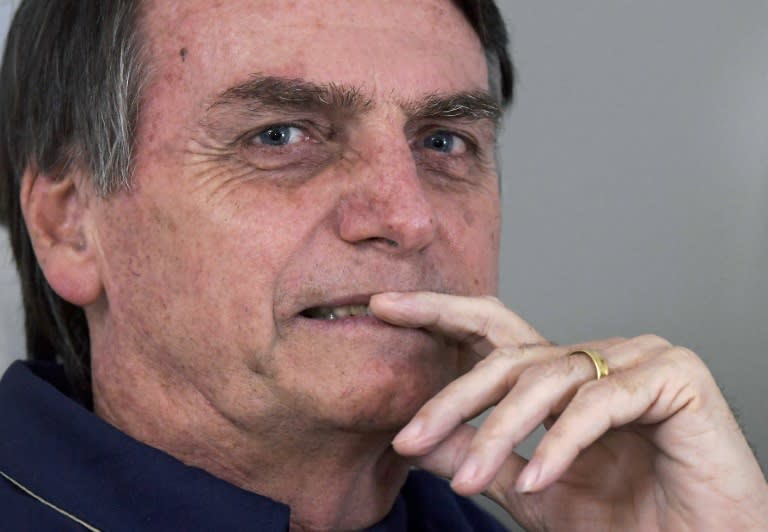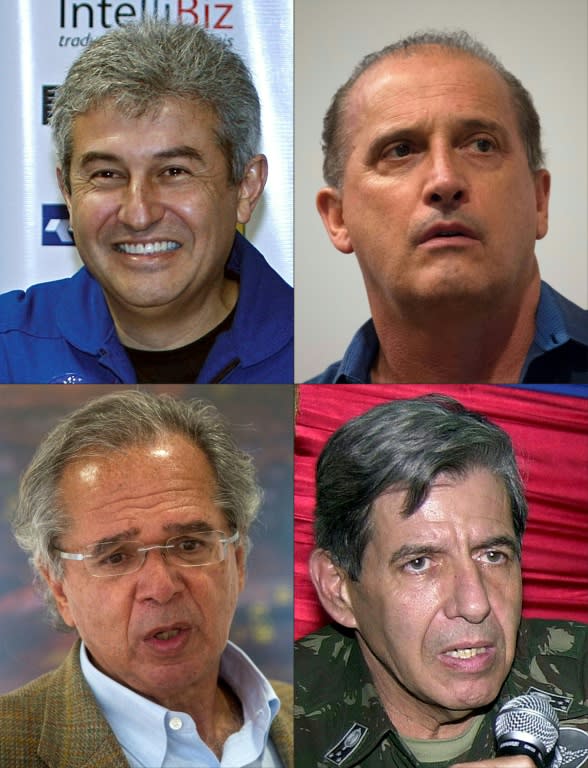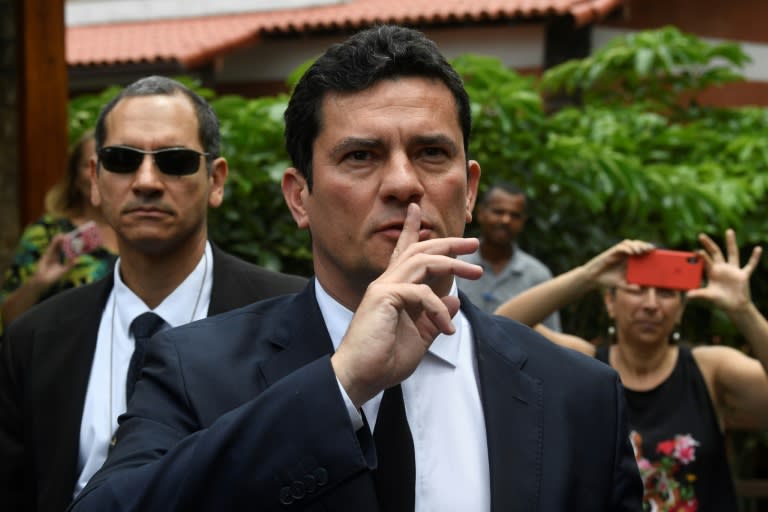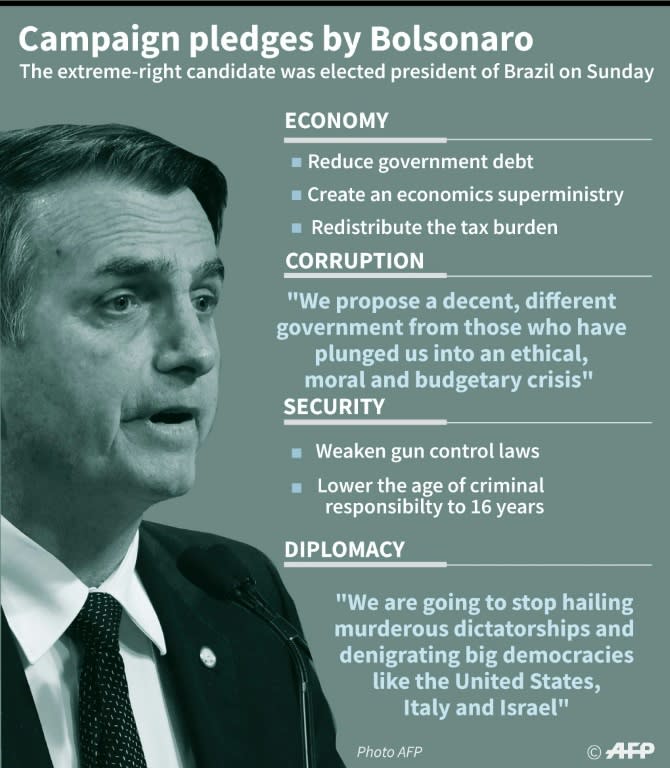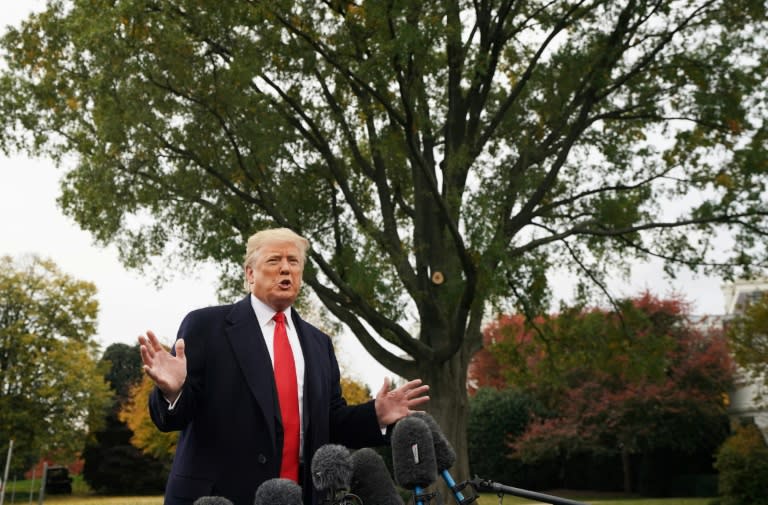Busy first week for Brazil's Bolsonaro
It was a busy first week for Brazilian President-elect Jair Bolsonaro, who showed his determination to roll out his conservative agenda on crime, corruption and the economy -- and sparked more than one controversy. Here is a rundown of what the far-right former army captain, who takes office on January 1, has been up to since Sunday's election. - Conservative cabinet - Bolsonaro, who wants to slash the number of ministries from 29 to 15, has announced five cabinet picks so far, mostly political outsiders. Aides say 80 percent of the cabinet is already lined up. -- Ultra-free market economist Paulo Guedes will head a "super ministry" combining the finance, planning, industry and trade portfolios. -- Bolsonaro's military academy instructor, General Augusto Heleno, will be defense minister. -- Astronaut Marcos Pontes, the first Brazilian in space, will be science minister. -- Crusading anti-corruption judge Sergio Moro will be justice minister. -- Seeking to balance the political inexperience of the rest, veteran lawmaker Onyx Lorenzoni will be chief of staff. Bolsonaro has gotten bogged down in controversy and backpedaling as he forms his government. The president-elect's solution to all things economic is to put business world hero Guedes in charge -- but some warn his new "super ministry" is so big it will be "impossible to manage," as financial newspaper Valor put it. Meanwhile, Moro -- who sent leftist ex-president Luiz Inacio Lula da Silva to jail -- has drawn criticism from some for his decision to enter politics in a far-right government. "Moro has irreversibly compromised his independence as a judge," said Brazil's leading newspaper, Folha de Sao Paulo. And after repeatedly flip-flopping, Bolsonaro backed off his decision to merge the agriculture and environment ministries, which critics said would sell out Brazil's natural resources to his agrobusiness backers. - Hardline policies - After dodging the loaded issue of pension reform late in the campaign, Bolsonaro confirmed he would attack Brazil's "monster deficit" by overhauling its bloated retirement system. The markets are demanding reform, but it is a political minefield. The retirement age in Brazil can be as low as 50 for women and 55 for men. "If we try to change it to 65, there's a good chance we'll fail. So we'll aim for 62," Bolsonaro said. It remains to be seen whether he can get meaningful reform through Congress, where his party will not have a majority. Bolsonaro also doubled down on his vow to relax gun control laws so "good people" can take justice into their own hands. Criminals, he said, "will be held responsible, either before the law or by being taken down." His future defense minister meanwhile backed a plan to use snipers to shoot armed suspects, even when officers' lives are not in danger. - Diplomatic turn - Ditching the "south-south" diplomacy of ex-president Lula, Bolsonaro wants closer ties with the United States. He will make his first foreign trips to Chile, the US and Israel -- countries that "share our worldview," said Lorenzoni. Following in the footsteps of President Donald Trump, whom he admires, Bolsonaro confirmed Thursday he would move Brazil's embassy in Israel from Tel Aviv to Jerusalem, defying the Palestinians and international consensus. He also cozied up to Italy's far-right Deputy Prime Minister Matteo Salvini, who warmly congratulated him on his victory and asked him to extradite "red terrorist" Cesare Battisti. The far-left ex-militant, who was convicted of murder in absentia in Italy, was granted refuge in Brazil under Lula. Bolsonaro's son Eduardo, a lawmaker, tweeted back to Salvini: "The gift is on the way." - Testy media relations - Bolsonaro was accused of attacking the independent media in his first days. Speaking after the election, he declared his commitment to the free press -- then immediately said of hard-hitting Folha, Brazil's biggest daily: "That newspaper is finished." "As far as I'm concerned, media that behave disgracefully will not get federal government (advertising) money," he said, apparently angered by Folha's reports on allegations he violated campaign finance laws and misused public funds. International press freedom groups condemned his statements. - Breaking the mold - Bolsonaro's communications strategy -- or lack of it -- is like no other president's in Brazilian history. He gave three separate victory speeches Sunday night: twice on Facebook and once on TV, after praying with his wife on camera. He has made some of his most important policy announcements on social media. Other key announcements have been made by advisors in front of his house or that of wealthy backer Paulo Marinho, favorite meeting spots for his inner circle.

